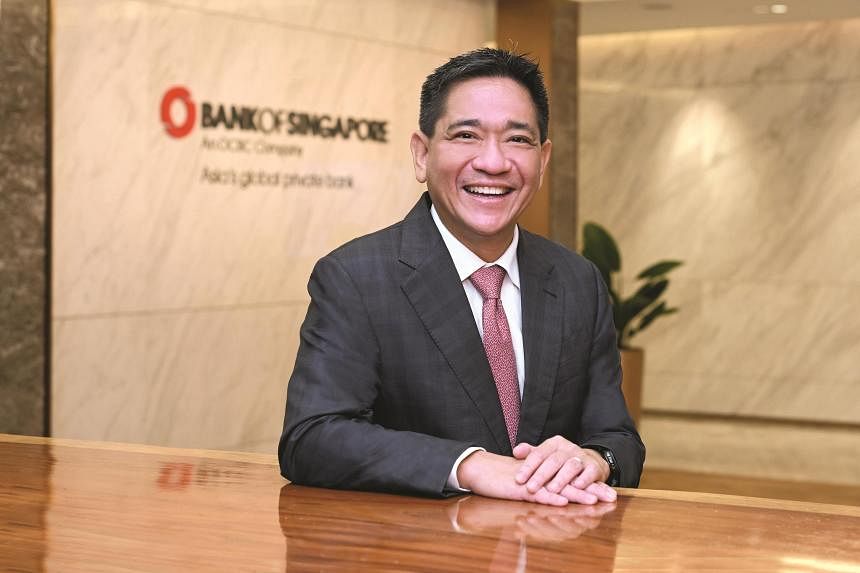SINGAPORE - It’s been a busy year at the helm of Bank of Singapore (BOS) for chief executive Jason Moo. He has made operational and senior management changes as he embarks on a major transformation strategy.
In short, he aims to make BOS the top Asian private bank within the next three to five years.
In a recent interview, the 51-year-old CEO told The Straits Times: “We want to be a bank where clients in this region can tap our spectrum of services and capabilities across different asset classes to access global markets. We want to be a globally recognised name.”
The bank is not doing this on a blank slate as it has already built a name for itself in the region, and is looking to build on that. “We want to offer the best advice, and the best platform where investors can access services and products they have not accessed before,” Mr Moo said.
The market for wealth management is undeniably there. The BCG Wealth Report in 2023 noted that Singapore’s political stability, forward-looking government policies and business-friendly environment are helping the country establish itself as a hub for South-east Asian investors.
Financial wealth booked in Singapore is expected to post a compound annual growth rate of 9 per cent through 2027.
And BOS is poised to benefit. OCBC Group Wealth Management, which includes BOS, has some $263 billion in assets under management (AUM) as at Dec 31, 2023. “Asia’s rising, and it has become an interesting place to invest money, not only just for being a source of money but for global investors and even Asian ones who want to invest in Asia,” Mr Moo said.
As Asia and Singapore rode the economic boom in the past decades, the region has become one of the wealthiest in the world. The trend that is being observed now is the generational transfer of wealth; at unprecedented levels in the last 30 years, Mr Moo added. Patriarchs, anywhere between the ages of 60 and 80, are handing over to their sons or daughters who are perhaps 30 to 50 years old.
The growing levels of wealth will necessitate the need for more and better wealth advice, but generational change may have other benefits. The younger generation may opt for a change in bankers.
Mr Moo noted with a twinkle in his eye: “The next generation prefers a banker who is kind of closer in age, only because then it’s easier to talk about the same values, talk about the same outlook, and that’s why most of them don’t take their parents’ bankers.”
This could be an opportunity for BOS, which currently has about a third of the single family office market in Singapore.
Traditionally, Asian wealth has banked with the famous Swiss names – UBS, which has acquired Credit Suisse, or smaller ones like Julius Baer. Other well-known names include American banks such as Citi, JPMorgan Chase and Goldman Sachs. In terms of wealth management, Asian players such as DBS Bank, UOB and even BOS, which was formed in 2010 after the acquisition of Dutch bank ING’s private banking arm, are newer to the game.
Mr Moo, who cut his banking teeth with Goldman before heading to Julius Baer, is confident that “there could well be a space for an Asian private bank which can offer a perspective different from (those of) the established European and American players and provide diversification for established Asian wealthy investors”.
Family offices and wealth advisory
BOS is well-positioned to grow. Already, it has earned awards in 2024 from media firm Asian Private Banker for its discretionary portfolio management, its chief investment office (CIO), as well as for its South-east Asian business and sustainable investment.
And there are growth areas. In 2023, the bank’s single family office clients grew 30 per cent. This business comes under the bank’s FFWA (Financial Intermediaries, Family Office, and Wealth Advisory) platform.
Another area is BOS’ financial intermediaries business which includes independent asset managers. This has been the bank’s fastest growth area for some time now, nearly doubling from 2020 to 2023.
Enhanced investment platform
With its ambitious aim of dominating the Asian private banking space in just a few years, BOS has to offer a compelling proposition.
To service the sophisticated groups of investors, be they family offices or asset managers, Mr Moo said that intellectual capital is important. “We need to give them advice they haven’t heard of before. We must continue to invest and differentiate ourselves on the advisory side.”
This is why BOS is beefing up its asset allocation approach, according to the self-professed product geek, who helped build the product platform for Goldman Sachs private bank in Asia.
The bank’s CIO office has implemented a fund management technology platform and will be expanding the asset allocation team this year.
Mr Moo is confident that this asset allocation approach will be a unique selling point that will guide clients as they invest, by giving clients more knowledge and enabling them to make better decisions.
BOS has now raised the minimum sum to be a client from US$3 million (S$4.1 million) to US$5 million. Mr Moo has observed that there are more people entering the ranks of the wealthy, and that the wealthy are getting richer. More wealth is being generated in Asia, either through investment returns or through economic and business growth in the region.
He said: “Raising the minimum sum sends a signal that we are positioning ourselves to serve the high- and ultra-high-net-worth clients with a differentiated proposition from other Asian private banks.”
Widening the range of services
Providing quality advice is important, but being able to offer a range of services is vital too, Mr Moo said. “If you look at some of the statistics that came in through the last couple of years, the banks that grew the most (in terms of assets) are actually the universal banks,” he noted.
With that in mind, BOS and OCBC have begun collaborating in a more systematic manner. OCBC’s corporate lending and treasury capabilities can meet BOS clients’ business needs.
On the wealth front, BOS is collaborating more closely with OCBC’s Global Consumer Financial Services, which is the arm that runs retail banking and looks after the premier and premier private clients. This also includes deeper collaboration across the OCBC Group, including with Great Eastern.
BOS – together with OCBC – offers an entire continuum of wealth services for clients as they grow their wealth. “We have services and platforms to meet all your needs, from a basic level to your global investment requirements,” said Mr Moo.
Key hubs and senior management
As part of the strategy, there have been management and operational changes.
With quality investment advisory being at the forefront of the strategy, the CIO office now reports directly to Mr Moo. Chief investment officer Jean Chia and her team will set the asset allocation framework and drive investment views and securities research.
This sets the direction for the bank’s advisory and discretionary portfolio management teams who will manage the clients’ assets in alignment with their return expectations and risk appetite.
Other changes include the appointment of global chief operating officer (COO) Jacky Ang, to strengthen operations and help oversee the transformation strategy.
Mr Moo has also streamlined how the offices are being operated. There are three hubs; namely Singapore, serving South-east Asia and Japan; Hong Kong, serving Greater China; and Dubai, serving the Middle East and Europe. These are a natural choice, being three of the world’s top wealth management hubs.
The COO for Greater China is Ms Ronnie Cheung, who is based in Hong Kong.
In Dubai, where BOS is ranked the third-largest foreign private bank by AUM, Mr Ranjit Khanna is the head of private banking for Europe and the Middle East and chief executive of the Dubai International Financial Centre branch.
With the financial intermediaries business remaining a key focus, BOS is building a team of experts across all the three hubs who will specialise in this strategic business.
In terms of relationship managers on the ground, BOS has said that it aims to have 500 of them by the end of 2025. At around 430 so far, it has some way to go. Mr Moo said that the bank continues to actively interview and hire people for the role.
With the pieces of the puzzle in place, Mr Moo is raring to go. “If you look at the wealth in Europe and the US, many of the families do all their banking with one bank. We aim for our clients to do more with BOS and the OCBC Group and be their choice of private bank.”
Correction note: The story has been updated to reflect Mr Ranjit Khanna’s current title.


